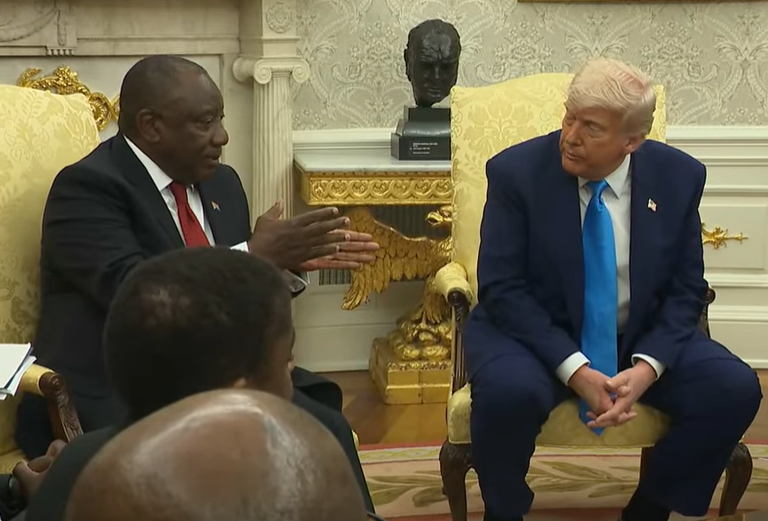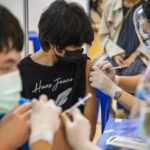President Donald Trump and President Cyril Ramaphosa of South Africa met on Wednesday night in a highly publicized event at the White House. The initial focus of the meeting was intended to be on trade relations and economic investments between the two countries. Ramaphosa expressed his desire to reset trade relations and promote investments in both countries, highlighting the existing business relationships between South Africa and the United States.
However, the meeting took an unexpected turn when a journalist questioned Trump about the granting of refugee status to Afrikaners from South Africa. This question led Trump to shift the conversation towards farm attacks in South Africa, a topic he has previously raised concerns about. Trump cited reports of violence and persecution against white farmers in South Africa, which he characterized as a form of genocide.
The discussion escalated as Trump played a video montage featuring controversial statements made by South African political figures, including EFF leader Julius Malema and former president Jacob Zuma, regarding violence against farmers. The footage sparked a heated debate between the two leaders, with Trump expressing his concerns about the situation in South Africa and calling for action to address the reported violence.
Ramaphosa, in response, defended South Africa’s democratic values and emphasized the importance of freedom of expression within a multi-party democracy. He refuted claims of a white genocide in South Africa and highlighted the diversity of voices within the country, including those of his delegation members who were present at the meeting.
The conversation between Trump and Ramaphosa alternated between discussions of farm killings, violent crime levels in South Africa, and lighter moments centered around golf, a shared interest between the two leaders. Despite the tense atmosphere, there were moments of levity as Trump engaged with South African golf stars Ernie Els and Retief Goosen, providing brief breaks from the intense discussions.
Overall, the meeting between Trump and Ramaphosa highlighted the complex issues surrounding farm attacks in South Africa and the differing perspectives on the situation. The dialogue between the two leaders underscored the challenges of addressing sensitive political and social issues within the context of international relations. The recent dialogue between President Donald Trump and South African President Cyril Ramaphosa shed light on the complex issues facing the country, particularly regarding land expropriation and farm killings. The conversation took place against the backdrop of tensions between the two nations, with the US imposing tariffs and canceling aid projects in response to South Africa’s controversial Expropriation Act.
During the discussion, Trump expressed concern about the expropriation of land without compensation and the violence against white farmers in South Africa. He criticized the lack of action taken against those responsible for farm killings, accusing the media of ignoring the issue. Ramaphosa, on the other hand, emphasized the need for calm and constructive dialogue between the two countries to address these issues.
The conversation also delved into the broader context of violence and crime in South Africa, with various stakeholders highlighting the need for improved policing and technology to combat criminal activities. Richemont chairman Rupert underscored the urgency of addressing violent crime across the country, not just on farms, and called for technological solutions such as Starlink to enhance law enforcement capabilities.
Cosatu president Zingiswa Losi highlighted the pervasive violence affecting all communities in South Africa, particularly in rural areas where black women are disproportionately targeted. She emphasized the importance of foreign investment in the country’s economy and called for support in tackling crime through technology and collaboration with international partners.
Overall, the dialogue between Trump and Ramaphosa underscored the complex challenges facing South Africa, including land reform, farm killings, and violent crime. While differing perspectives were expressed during the conversation, there was a shared recognition of the need for collaboration and dialogue to address these issues effectively. The call for technological solutions and international support reflects a recognition of the interconnected nature of these challenges and the importance of working together to find sustainable solutions for the benefit of all South Africans. As the debate over public health measures continues to rage on, one man finds himself torn between two conflicting priorities. “I haven’t made up my mind, I hate to say it…I am trying to save lives,” he responded when asked about his stance on the issue.
This man, who wishes to remain anonymous, is facing a difficult decision. On one hand, he understands the importance of taking measures to prevent the spread of disease and protect vulnerable populations. On the other hand, he is grappling with the economic and social impact of strict restrictions and lockdowns.
In a time when opinions are divided and tensions are high, this man’s struggle is emblematic of the larger societal debate. How do we balance the need to save lives with the need to maintain livelihoods? How do we protect public health without sacrificing personal freedoms?
It’s a complex and nuanced issue, with no easy answers. As this man weighs his options and considers the consequences of his actions, he is reminded of the weight of responsibility that comes with trying to navigate a global pandemic.
Ultimately, his goal remains the same: to do his part to help save lives. Whether that means supporting public health measures or advocating for a more balanced approach, he is committed to making a difference in whatever way he can.
As we continue to grapple with the challenges of COVID-19, it’s important to remember that we are all in this together. By listening to each other, respecting differing viewpoints, and working towards a common goal, we can overcome this crisis and emerge stronger on the other side.








